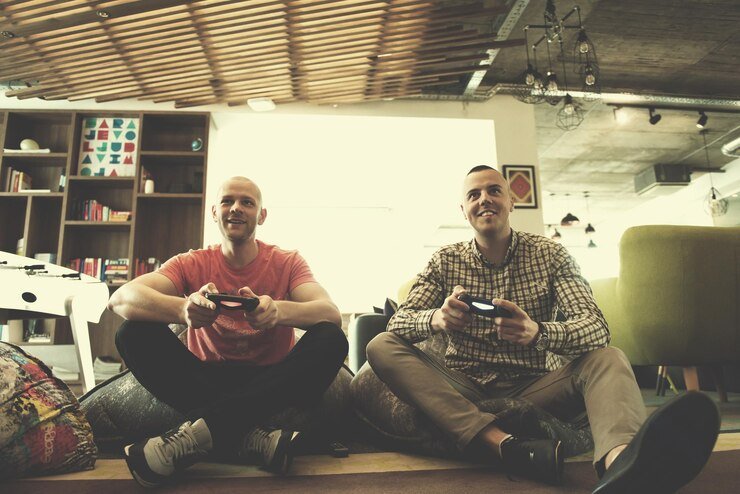In recent decades, gaming has shifted from being a niche activity to a powerful cultural force, weaving its way into the fabric of society and influencing art, communication, education, and erone community-building. Once associated mainly with entertainment, gaming now has a vast reach, impacting everything from social interactions to mental health awareness. Let’s explore how the power of play has transformed gaming into a cultural phenomenon with profound effects on the way we think, connect, and create.
1. Storytelling Reimagined: Video Games as Modern Mythology
Gaming has introduced a new form of storytelling, immersing players in narratives where their choices and actions influence the outcome. Unlike traditional media, games allow players to step into the shoes of protagonists, directly affecting the story’s progression and outcome. Games like The Legend of Zelda, Final Fantasy, and The Last of Us have become emblematic of gaming’s ability to convey deep, complex stories that resonate emotionally. These stories explore universal themes of struggle, heroism, and growth, creating modern myths that leave lasting impressions on players.
This interactive form of storytelling has set games apart from other forms of media. It allows players to forge a unique bond with the characters and storyline, as they are not just passive observers but active participants. Today, games often carry the same cultural weight as books or movies, sparking conversations and inspiring fan communities worldwide.
2. Building Global Communities
Online multiplayer games have broken down geographic barriers, connecting players from different backgrounds and cultures. Games like Fortnite, Minecraft, and World of Warcraft bring millions together in shared digital spaces where players interact, collaborate, and compete. These platforms foster a sense of camaraderie and community that often transcends language and cultural differences.
Through gaming, people form meaningful friendships, and online communities evolve into tight-knit groups that meet up at conventions, collaborate on creative projects, and support each other. The social nature of gaming has been especially significant during challenging times, offering players a source of connection, companionship, and entertainment.
3. Education Through Play: Games as Learning Tools
The educational value of gaming has gained recognition in recent years, especially with the rise of “serious games” that blend learning with play. From developing problem-solving skills in Minecraft to understanding historical events in Assassin’s Creed, games are increasingly used in educational settings to engage students and enrich learning. Educational games make abstract concepts more accessible, helping players learn in an interactive and memorable way.
Research also shows that gaming can improve cognitive skills like spatial awareness, critical thinking, and multitasking. Simulation games and virtual reality are being used in fields like medicine, engineering, and military training to provide immersive, risk-free learning environments that prepare students for real-world situations.
4. Mental Health and Well-Being
Gaming’s impact on mental health is a topic of growing interest. While excessive gaming can have negative effects, balanced gameplay can offer a valuable mental health boost. Many players find solace and stress relief in gaming, using it as a way to unwind or escape temporarily from real-life pressures. Games like Animal Crossing: New Horizons, with its calming gameplay and colorful environments, provided a haven for people during stressful times like the COVID-19 pandemic.
Furthermore, gaming has helped raise awareness of mental health issues. Games such as Celeste and Hellblade: Senua’s Sacrifice tackle themes of anxiety, depression, and trauma, helping players understand and empathize with these experiences. Some developers are even working with psychologists to create games specifically designed to help players manage stress and build resilience.
5. The Influence on Fashion, Music, and Art
The cultural impact of gaming extends to other creative fields like fashion, music, and visual arts. Iconic game characters and aesthetics influence trends in clothing, with collaborations between brands like Louis Vuitton and League of Legends, or Balenciaga and Fortnite, bringing gaming culture into high fashion.
Music is also deeply intertwined with gaming, from classic soundtracks like Super Mario Bros. to original scores by renowned composers. Gaming soundtracks are celebrated for their ability to evoke emotion and nostalgia, with concerts dedicated to video game music and streaming platforms allowing fans to enjoy soundtracks outside of gameplay.
In visual arts, gaming inspires both digital and traditional artists. Fan art communities thrive on platforms like DeviantArt and social media, while 3D modelers and animators draw influence from game aesthetics to create visually captivating art. Gaming conventions, like Comic-Con and E3, celebrate this culture with cosplayers, fan artists, and designers, further merging the world of games with broader artistic expressions.
6. Gaming and Technology: Driving Innovation
Gaming has played a significant role in advancing technology, pushing the boundaries of hardware and software capabilities. Graphics cards, virtual reality (VR), and augmented reality (AR) have been developed and refined to meet gaming demands. This innovation extends to non-gaming applications as well, with technology developed for games now used in architecture, medical imaging, and virtual training simulations.
The development of the “metaverse,” a shared digital space that integrates VR, AR, and the internet, is also being driven largely by gaming. Games like Roblox and Second Life pioneered digital environments where users can create, socialize, and interact, inspiring tech companies to explore immersive, shared online spaces.
7. Challenging Societal Norms and Broadening Perspectives
Games often reflect and explore societal issues, challenging players to think about topics like gender, identity, ethics, and politics. Games such as Bioshock, Papers, Please, and Life is Strange present thought-provoking scenarios that encourage players to examine their beliefs and biases.
Gaming has also contributed to discussions about representation and inclusion. With growing awareness, developers are creating more diverse characters and narratives that reflect the experiences of different races, genders, and sexual orientations. Games are a unique platform for storytelling that can broaden perspectives and foster empathy, providing players with experiences and viewpoints they might not encounter in their everyday lives.
8. The Business of Gaming: A Global Industry
Gaming has grown into a multibillion-dollar industry, surpassing both the film and music industries in revenue. As the industry expands, so does its influence, impacting job markets, economies, and the entertainment landscape. Streaming platforms like Twitch and YouTube have allowed gamers to turn their passion into careers, while e-sports tournaments draw massive audiences and offer significant cash prizes.
The gaming industry’s impact on global economies is evident, with the demand for game development, marketing, and design opening up countless job opportunities. This growth is driving further investment in new technologies, creating a cycle of innovation that keeps pushing the boundaries of what’s possible.
Conclusion: Gaming as a Cultural Cornerstone
The impact of gaming on modern culture is undeniable. It is more than a pastime; it is a cultural cornerstone that influences art, technology, relationships, and education. Gaming fosters creativity, builds communities, and allows players to experience new worlds and perspectives. As gaming continues to evolve, it will only deepen its impact, leaving a lasting legacy that reflects the values, challenges, and dreams of the people who play.
The power of play has reshaped our world, proving that gaming is not just an escape but a medium that enriches lives and expands horizons. Whether it’s through inspiring art, creating friendships, or driving technological advances, the influence of gaming is vast, and its journey has only just begun.



